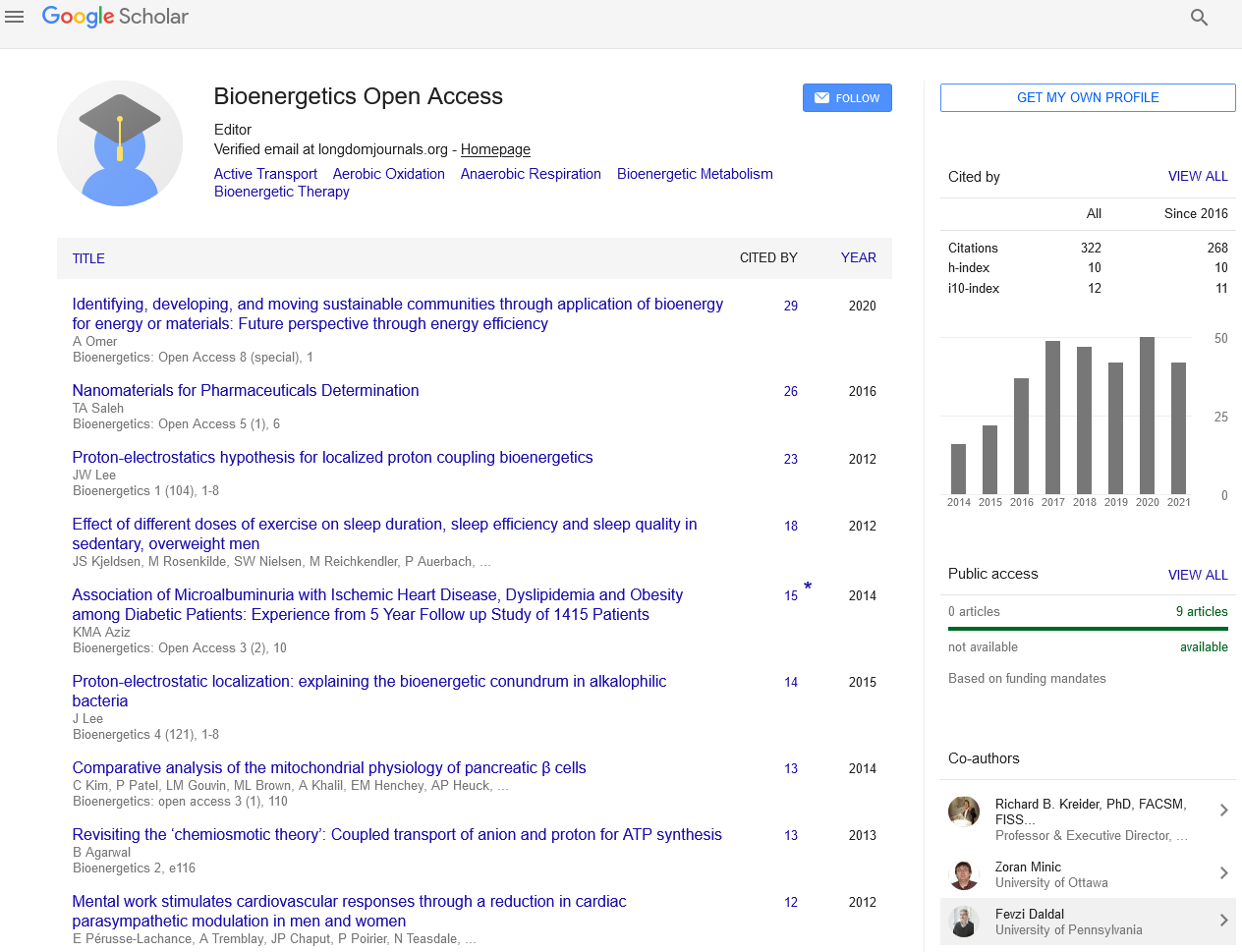Indexed In
- Open J Gate
- Genamics JournalSeek
- Academic Keys
- ResearchBible
- RefSeek
- Directory of Research Journal Indexing (DRJI)
- Hamdard University
- EBSCO A-Z
- OCLC- WorldCat
- Scholarsteer
- Publons
- Euro Pub
- Google Scholar
Useful Links
Share This Page
Journal Flyer

Open Access Journals
- Agri and Aquaculture
- Biochemistry
- Bioinformatics & Systems Biology
- Business & Management
- Chemistry
- Clinical Sciences
- Engineering
- Food & Nutrition
- General Science
- Genetics & Molecular Biology
- Immunology & Microbiology
- Medical Sciences
- Neuroscience & Psychology
- Nursing & Health Care
- Pharmaceutical Sciences
Conjugated linoleic acid induces TGF ò signalling regulate macrophage fate
3rd International Conference on Lipid Science and Technology
December 11-12, 2017 | Rome, Italy
Kawthar Alghamdi and Orina Belton
UCD Conway Institute - University College Dublin, Ireland
Scientific Tracks Abstracts: Bioenergetics
Abstract:
The chronic recruitment of monocytes and their subsequent migration through the endothelium contribute to atherosclerotic plaque development, the underlying cause of heart attacks and stroke. A specific blend of conjugated linoleic acid (80:20 cis-9, trans-11: trans-10, cis-12-CLA) has the unique property of inducing regression of pre-established atherosclerosis in vivo via modulation of monocyte function. Currently, there are no therapeutic targets which induce regression of pre-established atherosclerosis. Therefore, understanding the mechanisms through which CLA 80:20 mediates its atheroprotective effect is important for more effective management of this disease. This study aimed to identify novel pathways regulated by CLA, which inhibits monocyte function using a proteomic approach. THP-1 monocytes were treated for 18 h with CLA blend, a lipid control Oleic acid (OA) or DMSO (n=3 per treatment group). Proteins were trypsin-digested prior to analysis by liquid chromatography coupled to high resolution, high mass accuracy Orbitrap mass spectrometry. Global proteomic protein identities and relative quantitation were determined in a label-free approach, using the MaxQuant, Perseus and IPA suite of programs. A total of more than 1500 proteins were identified by mass spectrometry across the experimental groups using Perseus. Following statistical analysis using the t-test, 121 proteins were found to be significantly altered following treatment with CLA 80:20 compared to the control (DMSO). 103 proteins were unique to CLA blend and not altered by OA. Subsequent bioinformatics analysis of the regulated proteins showed enrichment of the TGFβ signalling pathway. Validation of proteomic analysis was performed by Western blot analysis of THP-1 monocytes. Our data revealed that CLA 80:20 blend regulates the TGF β signaling pathway in monocytes. This work contributes to our understanding of the atheroprotective pathways regulated by CLA 80:20 which impacts on monocyte/macrophage fate. Recent Publications: 1. Han X and Boisvert W A (2015) Interleukin-10 protects against atherosclerosis by modulating multiple atherogenic macrophage function. Journal of Thrombosis and Haemostasis 113(3):505-512. 2. de Gaetano M, Alghamdi K, Marcone S and Belton O (2015) Conjugated linoleic acid induces an atheroprotective macrophage MΦ2 phenotype and limits foam cell formation. Journal of Inflammation 12(1):15. 3. McCarthy C, Duffy M M, Mooney D, James W G, Griffin M D, Fitzgerald D J and Belton O (2013) IL-10 mediates the immunoregulatory response in conjugated linoleic acid-induced regression of atherosclerosis. FASEB Journal 27(2):499-510. 4. Bruen R, Fitzsimons S and Belton O (2017) Atheroprotective effects of conjugated linoleic acid. British Journal of Clinical Pharmacology 83(1):46-53. 5. Ward L J, Ljunggren S A, Karlsson H, Li W, and Yuan X M (2017) Exposure to atheroma-relevant 7-oxysterols causes proteomic alterations in cell death, cellular longevity, and lipid metabolism in THP-1 macrophages. PloS One 12(3): e0174475.
Biography :
Kawthar Alghamdi is pursuing her final year PhD in the School of Biomolecular and Biomedical Science, University College Dublin, Ireland under the supervision of Associate Professor Orina Belton. She received her MSc in Biotechnology from University College Dublin in 2013. Her previous work in the atherosclerosis research group at University College Dublin has shown that dietary administration of conjugated linoleic acid induces the regression of pre-established atherosclerosis via altering monocyte function. Her recent research has focused on the identification of distinct pathways regulated by conjugated linoleic acid that may yield further information as to how atherosclerosis can be reversed. To do this she has employed a comprehensive proteomic approach, to construct networks and identify key signaling pathways associated with altered monocyte/macrophage fate and function. Through this work she has identified and validated that TGFβ signaling mediates the atheroprotective effect of CLA.

